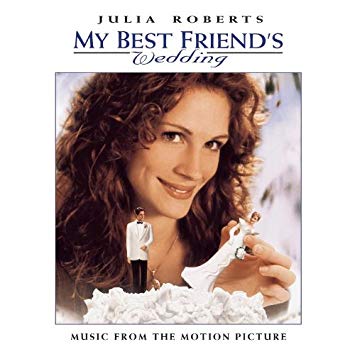by Chris Feil
 Time has been kinder to My Best Friend’s Wedding than what my memory of its initial response was: the film was too mean-spirited for a mainstream romantic comedy, Julia Roberts’ heroine’s reprehensible behavior at odds with her America’s Sweetheart status. Now the film’s legacy shows just how wrong those initial hot takers were, with its dismantling of genre fairy tale illusions being the core of its peak genre genius. Oddly, one of the primary ways it cracks open our expectations of cinematic romance is one of its most pleasing and digestible: its soundtrack of gold standard, Burt Bacharachian love songs.
Time has been kinder to My Best Friend’s Wedding than what my memory of its initial response was: the film was too mean-spirited for a mainstream romantic comedy, Julia Roberts’ heroine’s reprehensible behavior at odds with her America’s Sweetheart status. Now the film’s legacy shows just how wrong those initial hot takers were, with its dismantling of genre fairy tale illusions being the core of its peak genre genius. Oddly, one of the primary ways it cracks open our expectations of cinematic romance is one of its most pleasing and digestible: its soundtrack of gold standard, Burt Bacharachian love songs.
And the film announces that twist on the genre immediately to jarring effect: a satirical bridal overture rehashing of “Wishin’ and Hopin’”, most famously interpreted by Dusty Springfield. The sequence is pointedly dopey in its hyperfeminity, making satire of the kind of pristine wedding-centric vision women have been sold across decades. It’s antiquated in its charms, looked at with queer-adjacent judgment and delight in equal measure. As much as you could say this is the epitome of what Roberts’ Julianne reviles, it’s still the story she’s been sold like countless other women, and one she even falls prey to at times.
And as if Jules’ new nemesis Kimberly wasn’t already causing her enough territorial fury, Kimmy has to go and fuck with the Dusty Springfield songbook as well. Or rather Jules traps her into an embarrassment that ends up just making Kimmy all the more endearing: “I Just Don’t Know What to Do With Myself” on karaoke. Not only is her plan to degrade Kimmy foiled, but Kimmy is applauded for tarnishing the kind of music that the film has made emblematic of Julianne’s romantic expectations with the “perfect” Michael. As ever, Michael and Kimmy’s relationship flies in the face of that.
And by all appearances so far, Kimmy is the living prototype of the kind of woman embodied in the film’s opening sequence, minus the irony - so to fail so spectacularly here also cracks the storybook romance veneer deeper. It can’t be understated how brilliantly Cameron Diaz bleats her way through the ballad, an ear-bleeding rendition to instantly establish Diaz as a fearless comic talent. Death-rattling warble as high performance art.
That musical backhand to Jules’ expectations once again bites back when Rupert Everett’s George instigates a group sing along to another staple of divine love pop, “I Say A Little Prayer”. Here she gets to be the one who is embarrassed, left out of the group mood and the song itself. What’s so traumatizing for her is the abandon everyone has to the musical feeling, the admission of being pulled into cliched romantic longing. For her to sing along too would be to admit the feelings she really has for Michael, in a way. Or at least admit that even she wants something like a fairy tale love story as well. She looks across the table and Michael isn’t joining in either.
In the end, Julianne gives her fairy tale away. “The Way You Look Tonight”, once her and Michael’s song, is gifted as penance to the newly married couple. If the song once felt fittingly evasive for the best friends (its “I love you” stifled as an afterthought and subtext), for Michael and Kimberly it reinforces the affection they aren’t afraid to own. The musical sacrifice is its own loving gesture and the opposite of her karaoke divebomb, with the vision of romantic fantasy has dissolved into something genuine and harder earned.
All Soundtracking installments can be found here!